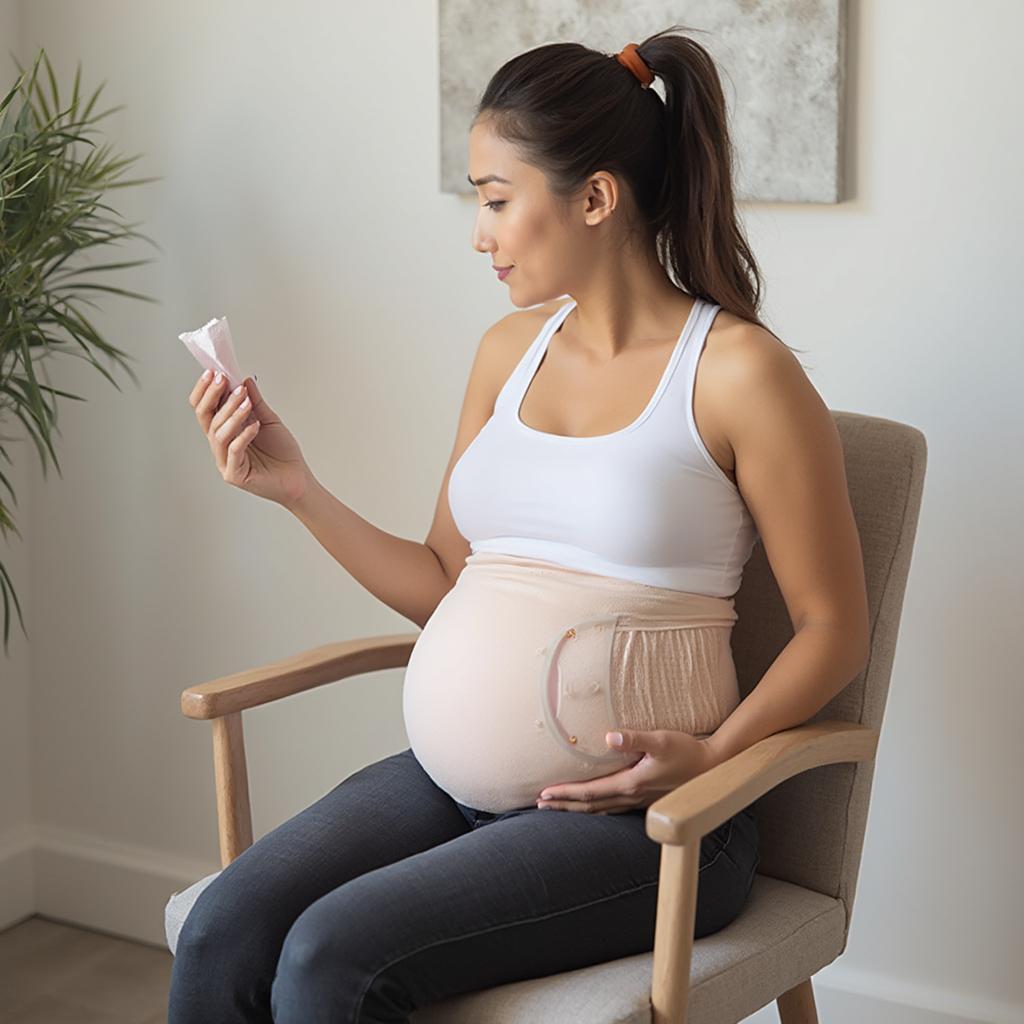Your cart is currently empty!

C Section After Care Tips: Your Guide to a Smooth Recovery
Recovering from a c-section requires specific care and attention. This comprehensive guide offers valuable C Section After Care Tips to help you navigate the postpartum period, ensuring a comfortable and healthy recovery.
Understanding the importance of proper aftercare is crucial for both physical and emotional well-being. This period involves healing from major surgery while simultaneously adjusting to the demands of motherhood. By following these c section after care tips, you can minimize discomfort, prevent complications, and focus on bonding with your newborn.
Managing Pain and Discomfort After a C-Section
Pain management is a top priority after a c-section. Your doctor will prescribe pain medication to help manage the discomfort. Don’t hesitate to take it as prescribed. In addition to medication, consider these tips to take care after c section and further alleviate pain:
- Gentle Movement: While rest is essential, gentle movement like short walks can improve circulation and prevent blood clots. Start slowly and gradually increase your activity level as you feel comfortable.
- Supportive Garments: Wearing a postpartum belly band can provide support to your incision and reduce pain during movement.
- Proper Posture: Maintaining good posture can minimize strain on your abdominal muscles and incision.
- Ice Packs: Applying ice packs to the incision area can help reduce swelling and numb the pain.
 Managing C-Section Pain with Ice Packs and Support
Managing C-Section Pain with Ice Packs and Support
Incision Care and Hygiene
Keeping your incision clean and dry is crucial for preventing infection. Your medical team will provide specific instructions on how to care for your incision. Generally, this involves:
- Gentle Cleansing: Clean the incision daily with mild soap and water. Pat it dry gently with a clean towel. Avoid rubbing or scrubbing the area.
- Keeping it Dry: Ensure the incision remains dry. Avoid baths or swimming until your doctor gives you the all-clear.
- Monitoring for Infection: Watch for signs of infection such as increased redness, swelling, pus, or fever. Report any concerns to your doctor immediately.
Navigating Postpartum Recovery Challenges
Beyond physical recovery, postpartum recovery also involves emotional and mental adjustments. Here are some care tips after c section to address these challenges:
- Rest and Sleep: Prioritize rest whenever possible. Sleep when the baby sleeps to maximize your recovery.
- Emotional Support: Connect with your partner, family, friends, or a therapist to discuss your feelings and concerns. Postpartum mood swings and anxiety are common, and seeking support can be invaluable.
- Healthy Diet: Nourishing your body with a healthy diet is essential for recovery and breastfeeding. Focus on nutrient-rich foods.
- Hydration: Drink plenty of water to stay hydrated, especially if you are breastfeeding.
Returning to Normal Activities
Gradually increase your activity level as you recover. Listen to your body and avoid overexertion. Consult with your doctor about when it is safe to resume activities such as driving, exercising, and lifting heavy objects. Much like [perennial care tips], consistent and gradual care is key to long-term well-being. Similarly, just like [tips to take care after c section], resuming normal activities should be done gradually and with proper care.
Conclusion
Following these c section after care tips can significantly contribute to a smooth and healthy recovery. Remember, every woman’s experience is unique. Be patient with yourself, listen to your body, and don’t hesitate to seek professional medical advice if you have any concerns. It’s also important to remember the fundamentals, just like [care tips after c section], or even basic [dry shampoo hair care tips], focusing on the foundational aspects is key. And if you’re looking for something completely different, consider exploring [careerbuilder com career tips].
FAQs
- How long does it take to recover from a c-section?
Recovery time varies, but it generally takes 6-8 weeks for the incision to heal completely. - When can I start exercising after a c-section?
Consult your doctor, but typically light exercise can be resumed after 6 weeks, with more strenuous activity after 8-12 weeks. - What are the signs of a c-section infection?
Signs of infection include increased redness, swelling, pus, or fever. Contact your doctor immediately if you experience these symptoms. - How can I manage c-section scar pain?
Over-the-counter pain relievers, ice packs, and gentle massage can help manage scar pain. - Is it normal to experience emotional changes after a c-section?
Yes, postpartum mood swings and anxiety are common. Seek support from your partner, family, or a therapist. - When can I drive after a c-section?
Consult your doctor, but it’s generally safe to drive after 2-4 weeks, depending on your pain levels and medication. - What can I do to minimize c-section scarring?
Keep the incision clean and dry, avoid sun exposure, and consider using silicone scar sheets once the incision is fully healed.
For further information, you might find our article on [care tips after c section] helpful.
Need assistance? Contact us via WhatsApp: +1(641)206-8880, Email: [email protected] or visit us at 456 Pine Avenue, Toronto, ON M5V 2J4, Canada. Our customer support team is available 24/7.

Leave a Reply